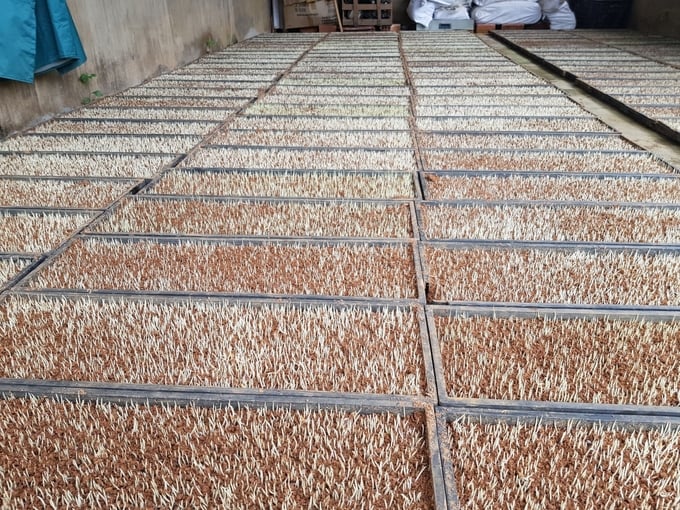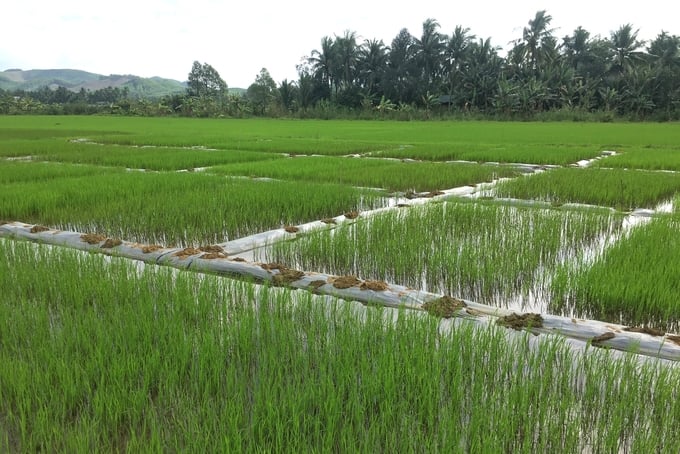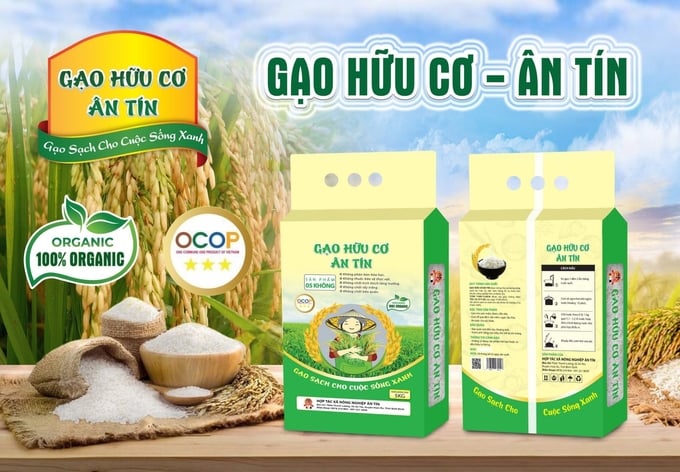November 28, 2025 | 04:57 GMT +7
November 28, 2025 | 04:57 GMT +7
Hotline: 0913.378.918
November 28, 2025 | 04:57 GMT +7
Hotline: 0913.378.918
An Tin Agricultural Cooperative, located in Hoai An District, Binh Dinh Province, is one of the most effective cooperatives within the region. The cooperative is currently providing ten different services, including organic rice production, agricultural supply provision, in-field irrigation, rice seed production and consumption, rice processing and distribution, household waste collection, drinking water provision, fuel sale, rural electricity management, and brick and tile production.
Among these services, the cooperative specializes in organic rice production. Notably, An Tin organic rice is currently in high demand among consumers in Hoai An District, selling at 30,000 VND per kilogram, with prices in Quy Nhon City starting at a minimum of 32,000 VND per kilogram.
According to Director Bui Long Xuan, An Tin Agricultural Cooperative began piloting organic rice production in 2019. Subsequently, the cooperative has consistently maintained 5.5 hectares of organic rice production area across two crops per year, with Dai Thom 8 being the primary cultivated variety. "Farmers must move away from traditional farming practices, as organic rice production requires strict compliance with regulated procedures,' Director Xuan noted.

An Tin Agricultural Cooperative utilizes tray-based seedling cultivation in their organic rice production process. Photo: V.D.T.
According to Director Xuan, the traditional rice sowing method involves two relatively simple steps: soaking the rice seeds and subsequently broadcasting them. However, the organic rice production process requires the seeds to be cultivated on trays after soaking. The soil within these trays consists of 70% soil and 30% sawdust. Furthermore, farmers must treat the soil with Trichoderma antagonistic fungi to eliminate pathogens one month prior to sowing. After the seeds have sprouted, they are dried in the sun for one day before being placed on trays for cultivation. Subsequently, the seed trays are preserved in a greenhouse, where they are regularly watered to maintain moisture for 15 to 20 days before being transplanted into the fields using machinery.
Nguyen Van Xuan, a technical officer at the An Tin Agricultural Cooperative, explained that tending practices in organic rice production differ significantly from traditional farming methods. If diseases or pests damage their rice plants, farmers are limited to using biological solutions for pest control, completely avoiding chemical pesticides.
Similarly, farmers must manually remove weeds from the field without the use of herbicides; or manually collect golden apple snails in the event of an infestation. Consequently, no chemical pesticides are allowed in organic rice fields. Farmers also utilize organic fertilizers, such as cow and chicken manure.
"Another key difference is that organic rice fields must be located away from traditional rice fields. Farmers must draw irrigation water from upstream to avoid possible contamination by chemical pesticides from neighboring fields," added Nguyen Van Xuan.

Tending practices in organic rice production differ significantly from traditional farming methods. Photo: V.D.T.
Farmers in An Tin Commune have followed traditional rice farming practices for multiple generations. With the aim of enabling the transition to organic rice production, An Tin Agricultural Cooperative developed and promoted a detailed production process to farmers through workshops and training sessions.
In addition, the cooperative’s technical staff provided hands-on guidance in the fields, with detailed demonstrations for each step of the process. They also regularly monitored the fields and stages of production to gradually help farmers adopt new farming techniques.
"After ten crop cycles, farmers have become proficient in organic rice production, requiring minimal reminders from the cooperative’s technical staff to comply with the established procedures," shared Director Xuan.
An Tin Agricultural Cooperative currently supplies 13 tons of organic rice to the market each year under the brand "An Tin Organic Rice." Outside of rice production, the cooperative also educates and encourages farmers to adopt water-saving irrigation methods, which is essential in the context of climate change.
Tran Van Long, an organic rice farmer and member of An Tin Agricultural Cooperative for the past five years, commented, "Organic rice production contributes to environmental protection by reducing the use of chemicals, pesticides, and inorganic fertilizers, as well as through efficient water management. Moreover, organic rice commands a significantly higher price compared to that of traditionally cultivated rice, thereby boosting farmers’ incomes."

An Tin organic rice is currently in high demand among consumers in Hoai An District, with an average selling price of 30,000 VND per kilogram. Photo: V.D.T.
According to Vo Duy Tin, Head of Hoai An District's Department of Agriculture and Rural Development, the district currently houses 17 hectares of organic rice production area, with the participation of seven agricultural cooperatives. Notably, An Tin Agricultural Cooperative is the pioneer in this initiative. The district's aim to expand organic rice production area aligns with its strategic agricultural development plan for the years between 2021 and 2025.
In 2023, Hoai An district implemented production unit codes for several organic rice fields to facilitate domestic market distribution. The district is also in the process of registering the "Hoai An Organic Rice" brand. In addition, the local government has established a supply chain to improve the product's marketability. They are also developing plans for product, trade, and investment promotion.
“Hoai An district is currently distributing its organic rice through Thanh Nien Agricultural Cooperative, which specializes in establishing connections between farmers and markets, and through the province's various e-commerce platforms,” remarked Vo Duy Tin.
Translated by Nguyen Hai Long

(VAN) According to Mr. Vo Minh Thanh, Director of the Tay Ninh Department of Agriculture and Environment, Resolution 57 has created a new development pathway for the locality, shifting from traditional toward modern agriculture.
/2025/11/26/4909-2-154329_878.jpg)
(VAN) Pearl grouper farming in HDPE cages not only delivers economic efficiency but also contributes to protecting the environment, creating jobs, and promoting marine-based experiential tourism.

(VAN) The model of making a living under the forest canopy through the agroforestry system in Van Son commune, Bac Ninh province, is expected to generate an annual income of approximately VND 30 million/ha.

(VAN) Many enterprises in Can Tho are harnessing natural energy and reducing greenhouse gas emissions in their production processes, thereby contributing to the promotion of a sustainable green transition.
/2025/11/24/3536-2-112800_176.jpg)
(VAN) Dong Nai now has tens of thousands of hectares of forests certified for sustainable management, and this area will continue to be expanded in the coming period.

(VAN) Vinh Ha hamlet (Dai Xuyen commune, Hanoi) is shifting away from small-scale farming as households adopt bioscurity into their breeder chicken models.

(VAN) Heavy rains make aquatic species more vulnerable to disease. Proactive water management and high-tech systems help farmers prevent outbreaks and protect yields.